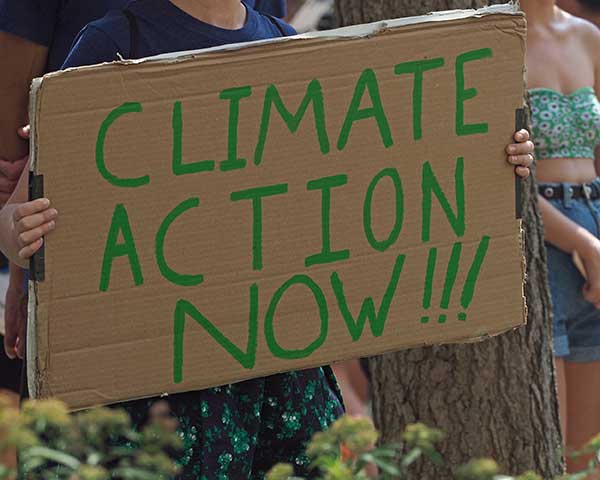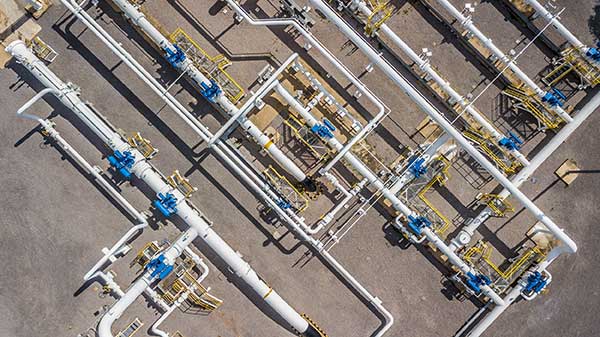-All eyes are on the U.S. as it prepares to lay out its Paris Agreement pledge stating the country’s Nationally Determined Contribution toward achieving a reduction in global emissions by the year 2030. At the same time, countries around the globe are stepping up the pace toward an energy transition, including Turkey and six small islands in the Caribbean.
U.S. Urged To Set More Ambitious Emissions Reduction Target
As the Biden administration prepares to give its Paris Agreement pledge for 2030, a new study shows the U.S. needs to reduce emissions by at least 57% to stay in line with the goal of limiting warming to 1.5 degrees Celsius.
President Biden has declared his intention of achieving net-zero emissions for the overall economy by the year 2050 and for the U.S. electricity grid by the year 2035.
But the study shows that the country’s initial pledge from 2015 will not achieve this goal. Under the 2015 Nationally Determined Contribution from the U.S., there is likely to be almost 4 degrees Celsius of global warming by the end of the century.
Environmentalists and EU officials are encouraging the U.S. to lead by example when it declares its new Nationally Determined Contribution toward reducing global greenhouse gas emissions for the year 2030. They are asking the U.S. to aim for at least a 50% reduction in emissions below 2005 levels.
According to the study, the U.S. needs to cut emissions from buildings by 60% as well as ensure nearly 100% of new car sales in the U.S. are emissions-free by 2030.
New Jersey Energy Gas Expanding Energy Efficiency Program
The New Jersey Energy Gas utility company has received regulatory approval to invest $259 million in energy efficiency for both residential and commercial customers.
The investment is designed to make energy efficiency more affordable and includes the opportunity to have the energy efficiency of buildings assessed at no cost to the consumer.
The program, which begins on July 1, should help reduce the energy bills of low- and moderate-income customers through the use of no-cost energy efficiency kits as well as incentives and rebates for home energy improvements. Eligible homeowners will also benefit from longer payment terms for upgrades.
The utility expects to recoup the investment through a small increase in the bills of consumers, with a $21 increase expected for the typical residential customer in the first year. Customers are expected to save as much as 125 million therms of natural gas within three years, equating to more than 660,000 metric tons of carbon dioxide.
Fortescue Metals Focusing on Green Energy
The world’s fourth-largest iron ore producer, Fortescue Metals, announced plans to go carbon neutral by 2030, partially through the production of green hydrogen.
To advance this goal, Fortescue, an Australian company, has signed a memorandum of understanding with Brazil’s Porto do Açu to look into the feasibility of establishing a 300-megawatt green hydrogen plant there.
Green hydrogen is a carbon-free fuel made by using renewable energy to split water into oxygen and hydrogen.
A final decision will be made this year about the investment. If the decision is made to go ahead with construction of the plant, the company hopes to begin commercial scale production by 2023.
Fortescue owner Andrew Forrest says much of the hydrogen produced will go toward making steel production in Australia green.
He is also interested in using the green hydrogen to produce green ammonia for shipping, to install battery technology in his company’s haul trucks, and to convert iron ore to green iron.
To further his goal of carbon neutrality, Forrest will be aiming for absolute emissions reductions at his company in some aspects of its operations, rather than using carbon offsets. He has also decided that the pay of company executives would be linked to their achieving emissions reductions targets.
British Pension Scheme Focuses on Green Investments
Nest, a British pension scheme that manages retirement savings for one-third of the U.K.’s workforce has announced that it will be investing 1.4 billion pounds in renewable energy projects.
Nest will make the green investments through an arrangement with Octopus Renewables, a major EU and U.K. renewable energy investment company with a portfolio of 3 billion pounds in assets.
Nest sees the move to green energy investments as providing more reliable, long-term benefits.
The move is also in keeping with the pension scheme’s commitment to environmental responsibility and reducing its emissions.
A survey of Nest’s pension scheme contributors last year showed that 65% wanted their investments to contribute to the fight against climate change.
Turkey Powers Ahead With Renewables
Turkey made significant strides toward improving its energy security over the past year, with renewables playing a major role.
The country’s president, Recep Tayyip Erdoğan, told parliamentarians recently that 63% of electricity in 2020 came from local and renewable sources. The country has 50,000 megawatts of installed renewable energy, and wind energy now contributes 10% of the country’s total electricity production.
An International Energy Agency report said that Turkey has sought to increase its energy security through the introduction of renewables and an emphasis on energy efficiency.
A recent gas discovery in the Black Sea will likewise reduce its gas import dependency by 36%.
The agency said Turkey has increased renewable energy capacity by 50% over the past five years and ranks in the top five European countries for installing new capacity.
However, the country’s growing economy that has driven the need for greater energy security is also making it difficult for Turkey to fulfil its emissions reductions target under the Paris Agreement. Over the past decade, energy-related emissions have grown by over 43%.
Companies Propose Green Hydrogen Infrastructure for Europe
Seven companies in Europe have formed a consortium with the goal of establishing a green hydrogen infrastructure that will use existing gas pipelines for transporting the fuel.
The companies include German chemicals producer Evonik; BP; German gas suppliers OGE, Nowega, and Thyssengas; multinational electricity firm RWE; and German steel subsidiary Salzgitter Flachstahl.
The cross-border infrastructure would facilitate the use of green hydrogen in refineries, steel production, and other industries. It’s expected to reduce 16 million tons of CO2 emissions by 2030.
One of the project partners, RWE, currently produces green hydrogen. With the proposed infrastructure, it would supply this hydrogen to BP’s refinery in Gelsenkirchen, Germany. From 2030, the hydrogen gas pipelines are to be extended to the steelworks of another project partner, Salzgitter, in Germany.
The companies believe this project would lay the basis for a green hydrogen value chain. As such, they have applied to Germany’s Federal Ministry of Economics and Technology for funding under the Important Project of Common European Interest (IPCEI) program.
If the requisite regulatory amendments are made, the project could be implemented gradually between 2024 and 2030.
British Firms Press for Clean Energy Tax Cuts
The Confederation of Business Industry (CBI) is calling for changes in taxation to reward the retrofitting of buildings for energy efficiency and the purchasing of electric vehicles.
Specifically, the CBI is asking for a reduction in the VAT charged on electric vehicles from the standard 20% and for building taxes not to increase in line with their greater value after retrofitting.
The organization says the tax system should be designed to discourage “polluting behaviors” while rewarding green investments.
The International Monetary Fund has recommended green taxation to the U.K. to generate increased revenue.
The CBI said such taxes should be designed to help businesses achieve net zero by clearly defining polluting behaviors and targeting such behaviors in a way that encourages emission-reducing decisions.
Sustainable Energy Initiatives Underway in the Caribbean
Six Eastern Caribbean states took part in what is described as the region’s largest renewable energy training event to date. The six-month program drew 228 participants who learned skills in solar photovoltaic installation and inspection.
Funding for the training came from the European Union and the U.K.’s Foreign Commonwealth and Development Office through the regional Caribbean Development Bank.
Participants learned to design, install, operate, and maintain PV systems as part of an initiative to build a regional renewables skills base.
Caribbean states will also benefit from a new Inter-American Development Bank agreement with the International Renewable Energy Agency.
A press release said the partnership will promote access to sustainable finance for renewables in the region through the creation of renewable-enabling market conditions.
Opinion writer: Jewel Fraser
The opinions, beliefs, and viewpoints expressed by the various authors do not necessarily reflect the opinions, beliefs, or viewpoints of Interactive Energy Group, LLC (IEG) or its parent companies or affiliates and may have been created by a third party contracted by IEG. Any content provided by the bloggers or authors are of their opinion and are not intended to malign any individual, organization, company, group, or anyone or anything.
Brought to you by energysavings.com
All images licensed from Adobe Stock.



